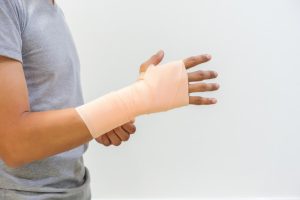Posted on Wednesday, April 20th, 2022 at 11:44 am
 There are stages to every personal injury lawsuit. If you were injured because of someone else’s negligence or risky actions, you may choose to file a personal injury lawsuit if you are unsuccessful in negotiating a fair settlement with the at-fault party’s insurance company.
There are stages to every personal injury lawsuit. If you were injured because of someone else’s negligence or risky actions, you may choose to file a personal injury lawsuit if you are unsuccessful in negotiating a fair settlement with the at-fault party’s insurance company.
The discovery phase of a personal injury lawsuit is an essential tool for both sides to gain a greater understanding of the circumstances surrounding the accident. This is a formal exchange of information between the parties involved.
This information can include evidence, witness statements, and facts about the case. Discovery may be completed before negotiations with the at-fault insurance company are completed. The information gathered during this process may prompt successful negotiations that result in a fair settlement for you.
Stages of a Personal Injury Case
There are several stages of a personal injury case, of which discovery or fact-finding is just one. It all begins when you consult with an injury attorney to determine if you have a valid claim. Before filing a lawsuit, lawyers usually make a demand to the other party.
The demand letter can be delivered to an individual, insurance company, or even your employer. If a settlement cannot be reached at this stage, you may choose to file a complaint with the court. It’s important to take note of the statute of limitations in Alabama, which is two years from the date of the accident. If you do not file a case before the statute of limitations runs out, you relinquish your right to recover compensation in court.
The next stage is discovery, which can often take more time than the other stages. After discovery has ended, ideally, a settlement can be reached between the two parties. If this does not happen, then a trial is necessary to recover compensation for your injuries and damages.
Purpose of Discovery
 Discovery is crucial to your case since it helps your attorney gather and prepare information to support your claim. Information that is discovered may be used later against the other party. This is part of pre-trial preparation. During this process, you will probably be asked questions about the incident, and you and your attorney will have the opportunity to request information from the other party.
Discovery is crucial to your case since it helps your attorney gather and prepare information to support your claim. Information that is discovered may be used later against the other party. This is part of pre-trial preparation. During this process, you will probably be asked questions about the incident, and you and your attorney will have the opportunity to request information from the other party.
What Happens During Discovery?
Four key actions can occur during discovery. The process can take a few weeks to a few months. Your personal injury lawyer at Farris, Riley & Pitt, LLP will approach discovery with a specific strategy. This helps to uncover as much information as possible to help support your claim while working within the confines of the law. These are the actions that your attorney can take during discovery:
Interrogatories: This is a process that involves a written set of questions that is sent from one side to the other. It is essential that the questions are answered honestly. In some cases, your attorney may determine that there is a valid objection to answering a question and will direct you on what to do in that case.
There are two types of questions asked during interrogatories: general questions that include common information or questions that are specific to the case. General questions may include contact information or the identity of witnesses who might be called in the case. Specific information includes an explanation of how the accident happened, identification of evidence, and information about your medical treatment.
Request for production of documents: This is the actual evidence that’s provided to the other party when it is requested. Your attorney has the potential to object to providing copies of this information. Documents might include your medical records, medical bills, employment records, police or accident reports, and pictures or videos of the accident scene.
Request for admission: These are written factual statements by one party to the other that admits, denies, or objects to the substance of the statement. You have 30 days to respond to a request for admission.
Deposition: This is likely the part of the discovery process that you have seen on television shows. This is an out-of-court testimony that is recorded, transcribed, and later used in court. Either side can request a deposition of the other party, expert witnesses, or lay witnesses that are declared in the lawsuit.
Depositions can be beneficial to help capture an account of the accident or event, as well as the important details of what happened before and after. Either side has the option to use the transcript or a video recording during the trial to corroborate or dispute testimony.
Contact Farris, Riley & Pitt, LLP Today for a Free Consultation
If you were involved in an accident that was not your fault, contact the Birmingham personal injury lawyers of Farris, Riley & Pitt, LLP today. Our experienced and skilled attorneys understand that you have a unique story, and we are ready to hear it. Call our office today at (205) 324-1212 or contact us online to schedule your free consultation.















